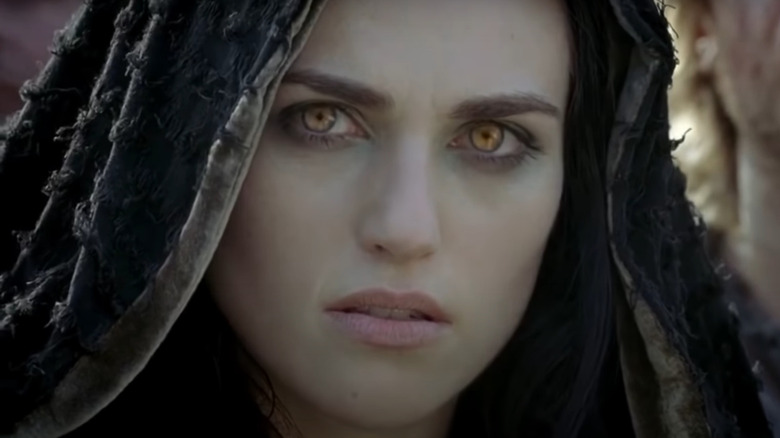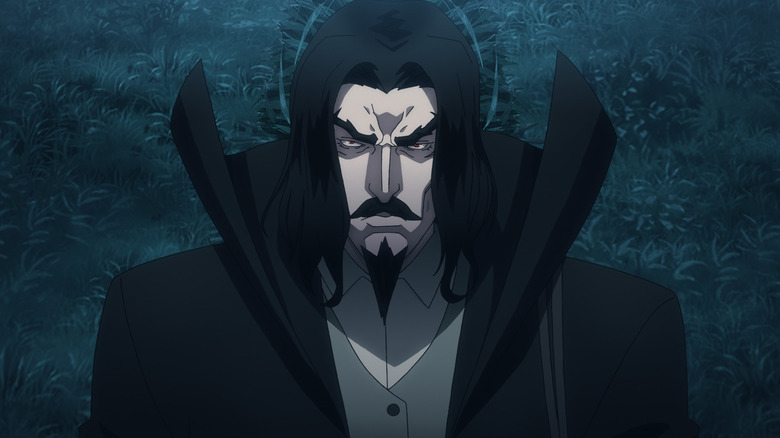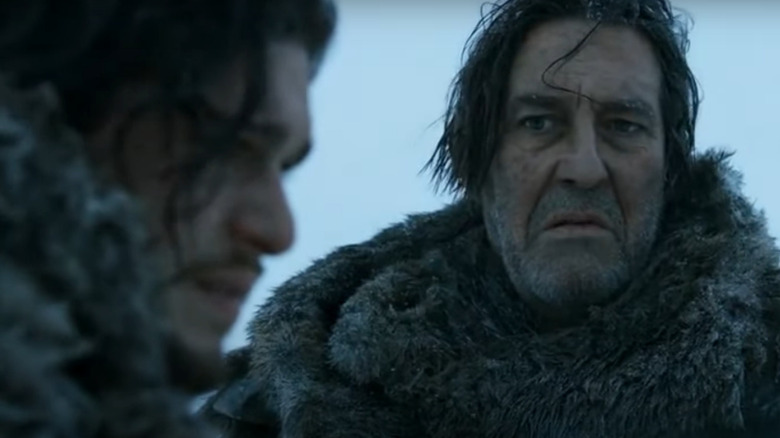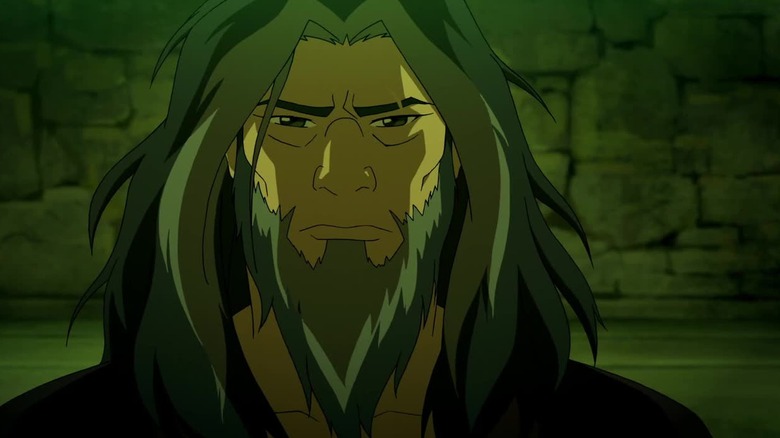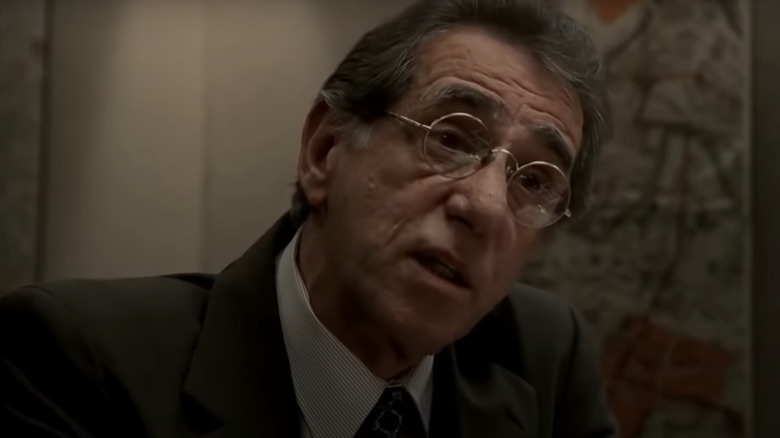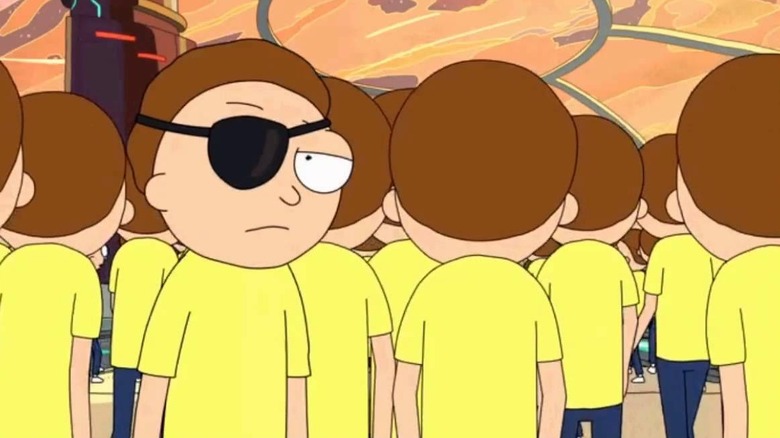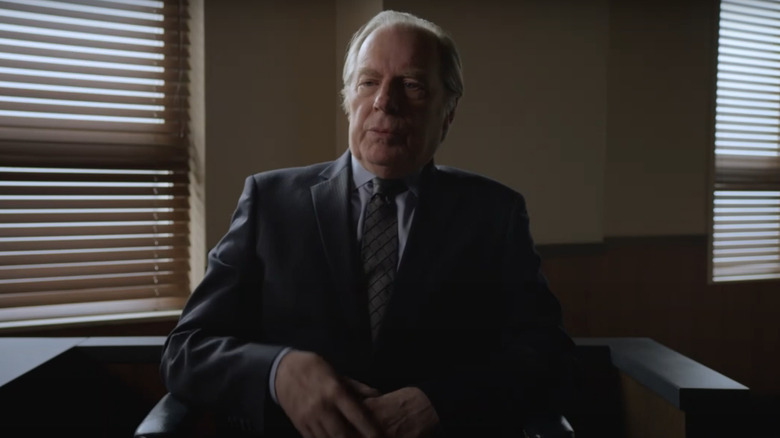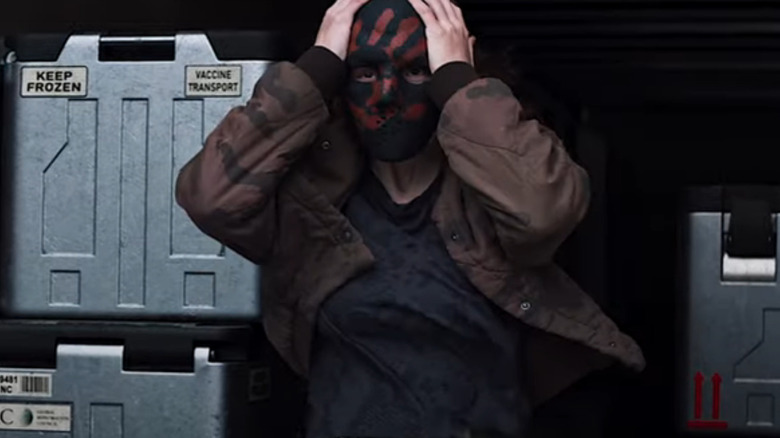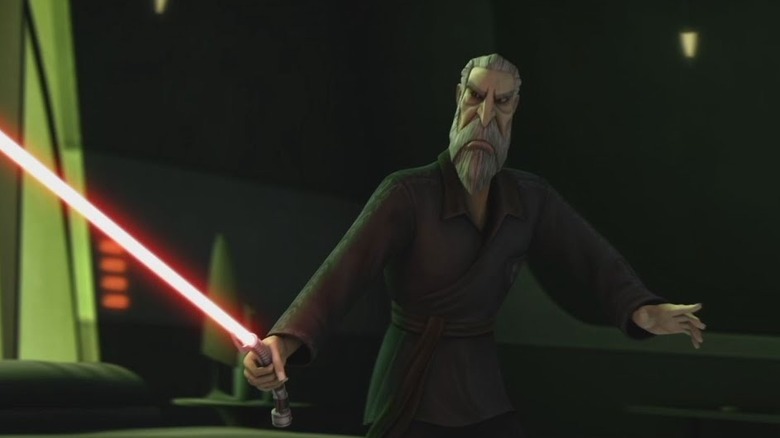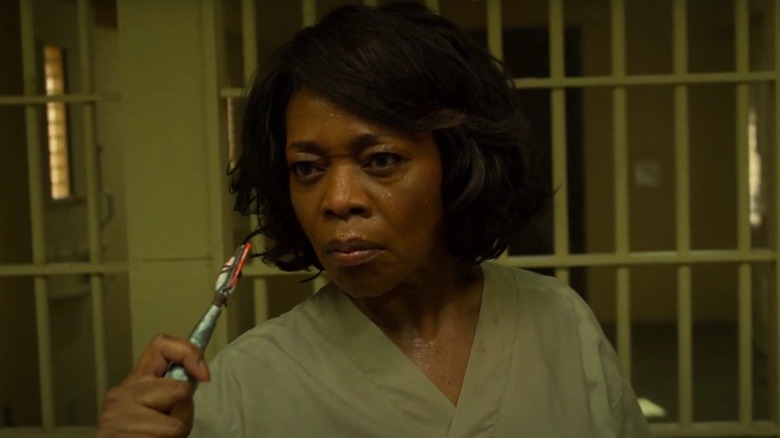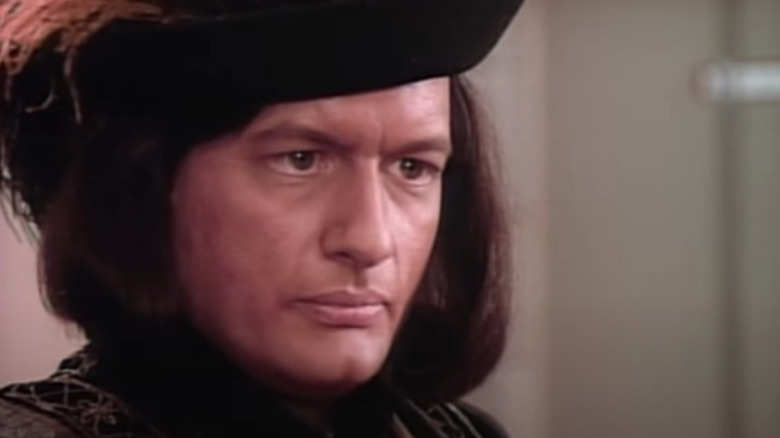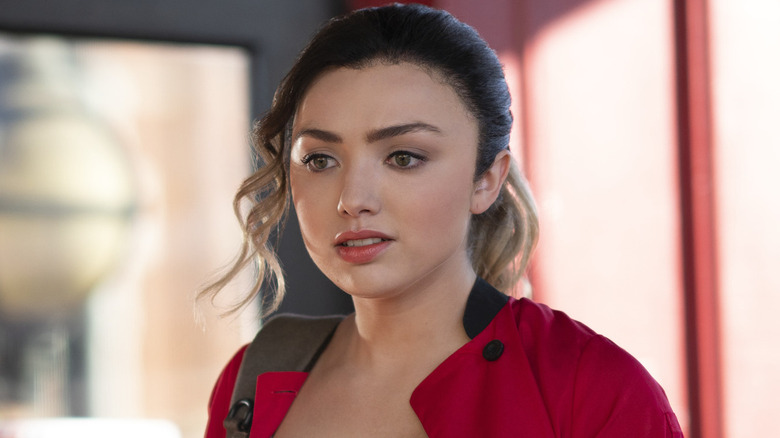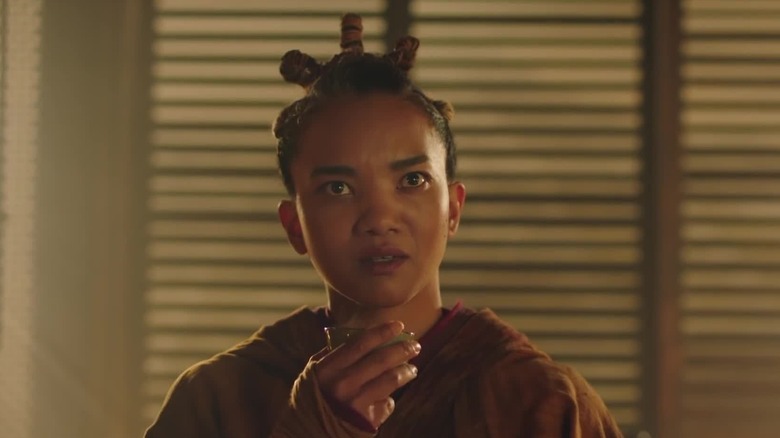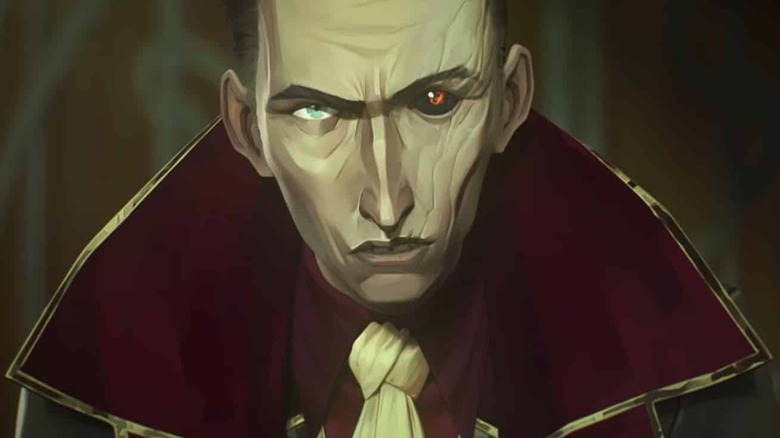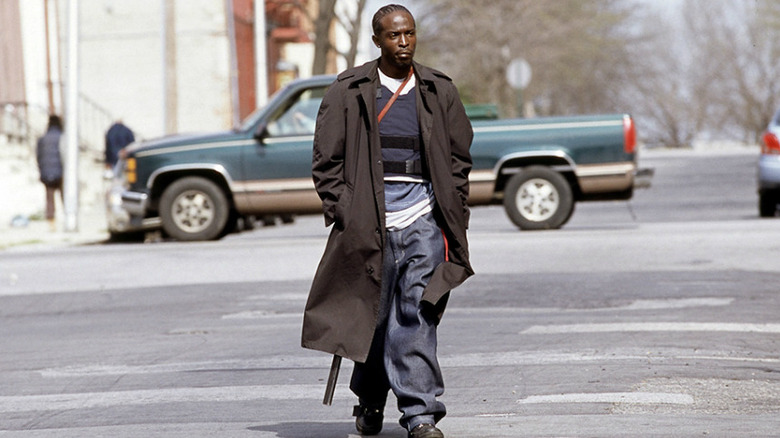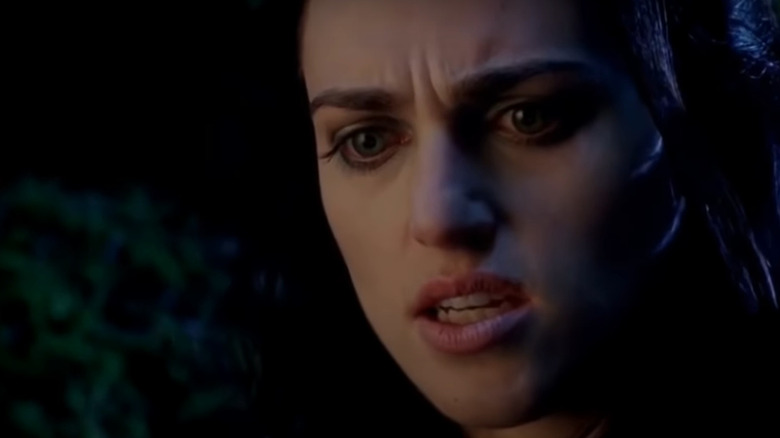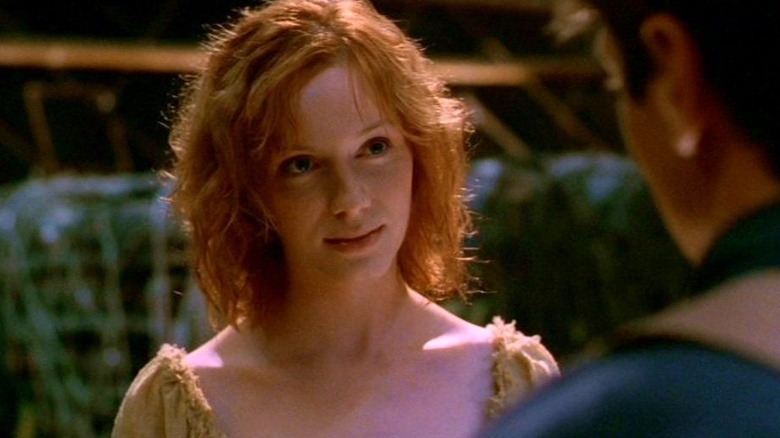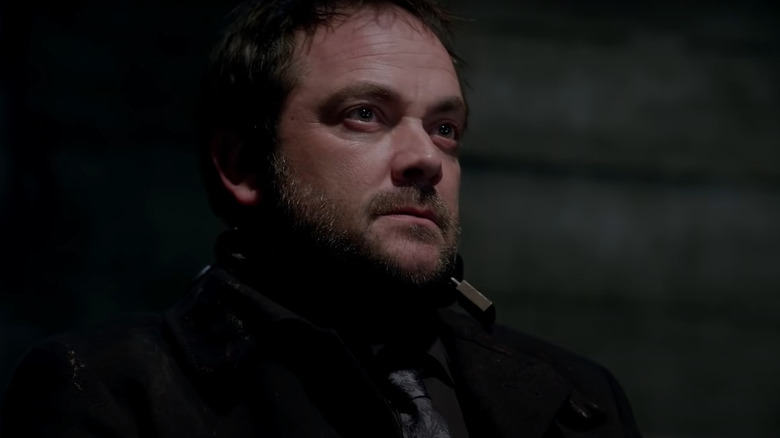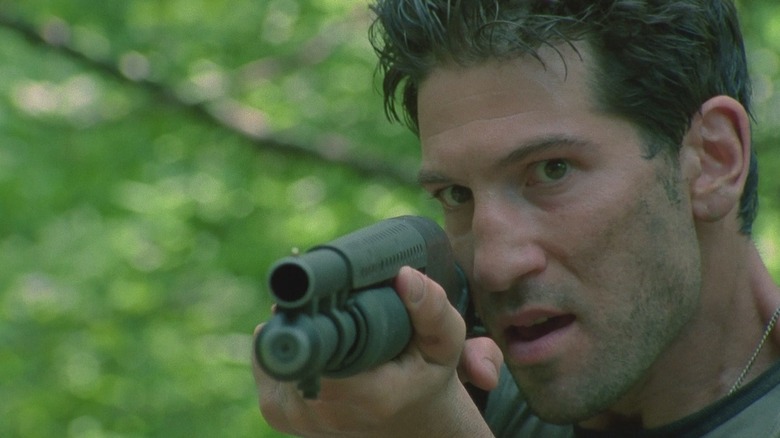Times The Bad Guys In TV Series Were Actually Right
Despite their evil ways, villains have a way of captivating us. Their tragic backstories, effortless suave, and Shakespearean monologues are enrapturing, often making them more interesting than the heroes of their stories. This is especially true for villains in TV shows, as they often have years and multiple seasons to build out complex and compelling arcs. Will they be redeemed? Will they be defeated? These are the questions that keep us on the edge of our seats.
When the villain in question actually makes some good points and challenges the hero's own sense of right and wrong, things get even juicier. Whether they're extremists who take good intentions just a bit too far or deeply wounded characters with sympathetic vendettas, villains who can get the audience to root for them are some of the most fun to watch. They don't all turn to the side of good, and they certainly don't have airtight philosophies, but there are times when these complicated bad guys can convince us that they're actually the ones in the right.
Throughout TV history, and especially in more recent times, these persuasive villains have frequently reared their heads. Be they animated or live-action, supervillains or ordinary citizens, they enrich their stories and keep us talking long after the final credits roll. Here are some TV bad guys who were actually right.
Castlevania - Dracula
Netflix's critically acclaimed animated adaptation of Konami's "Castlevania" video game series is a master class in compelling villains. Every antagonist in the show is interesting, from the power-hungry vampire queen Carmilla and the serially manipulated necromancer (or forgemaster, in the language of the show) Hector to the severely misanthropic Isaac. Many of the best storylines and conflicts in "Castlevania" come from the relationships between these different bad guys. While they each have uniquely intriguing arcs, they all orbit around the core villain of the show: Dracula.
At the start of "Castlevania," Dracula is portrayed as a recluse. His centuries upon centuries of murder and conquest eventually left him aimless, leading to him closing the doors of his magical castle and living a hermit's life. That all changes, though, when a woman named Lisa from a nearby village knocks on his front door and asks to read through his libraries of accumulated scientific knowledge. She's a doctor who wants to educate herself so that she can better help people. Blown away by her generosity, Dracula allows her to stay and eventually falls in love with her. They marry and have a son together, but their familial happiness is torn asunder when agents of the Church condemn Lisa for witchcraft and burn her at the stake.
Thus begins Dracula's genocidal war against the human race–a campaign that's indefensible, but starts from a deeply sympathetic place. Is Dracula right to want all humans dead? No. Is he right to believe their institutions corrupt and their leaders greedy and violent? Yes.
Game of Thrones - The Wildlings
"Game of Thrones" generally isn't the show to watch if you're looking for sympathetic villains. The series is littered with the most reprehensible characters imaginable, from sadistic monsters like Joffrey Baratheon and Ramsay Bolton to supernatural forces of evil like the Night King. However, some antagonists in the HBO fantasy saga deserve the benefit of the doubt, and a lot of them live north of the Wall.
The Wildlings are introduced as savage, lawless renegades who mock the authority of Westeros' great houses and live to thieve and murder. There are certainly some more despicable figures among the Wildling ranks (looking at you, Rattleshirt), but most of them are just ordinary folk who'd rather live freely than pay tribute to the continent's pompous lords and ladies. Mance Rayder, the so-called King Beyond the Wall, is a fair-minded and even-tempered man who does what he believes is necessary to protect his people in a brutal place. Most of his ill deeds are prompted by that devotion–which, given how quickly people can die in lands of the White Walkers, is admirable.
It's also understandable why the Wildlings go to such great lengths to avoid the royals of Westeros. Time and again, the heirs of the great houses prove that they're far more interested in hoarding their spoils than protecting their own citizens. Mance is a better leader than most of them, and he's honest about his darker side.
The Legend of Korra - Zaheer and Amon
The whole "Avatar: The Last Airbender" timeline is filled with morally gray characters–people who, for one reason or another, allow initially good beliefs to be taken too far. This is especially true in "The Legend of Korra," in which the eponymous Avatar must constantly weigh equally questionable sides in different global conflicts.
Korra's first brush with villainy comes in the form of Amon, the leader of an anti-bending faction called the Equalists, who believe that non-benders have been subjugated for most of history and deserve reparations and equal status with benders. That goal is pure, and the Equalists are justified in their frustrations. At the time, Republic City is run by a council of representatives from the bending nations, pro-bending athletes are deified, and dangerous street gangs of benders regularly terrorize ordinary citizens. Amon (who's actually a bloodbender in disguise) takes things way too far, but some positive effects of the Equalist movement can be seen later in the series, such as in the democratically elected, non-bender president of Republic City.
In Season 3, Korra encounters another villain who veers just a little too far into the dark side: Zaheer. A devoted anarchist, Zaheer believes that most of the evil in the world is systemic and caused by corrupt leaders and governments. His theory is pretty strongly supported by how the show paints characters like the Earth Queen, and some of the people he fights (and kills) are objectively vile. Like Amon, though, Zaheer takes his philosophy a little too far and ultimately falls out of balance. In the show's final season, he finds some redemption by aiding Korra in her healing process.
The Sopranos - Frank Cubitoso
In crime shows where the protagonists are evil and the antagonists are trying to bring them to justice, titles like "hero" and "villain" can be tricky. You wouldn't call Hank Schrader of "Breaking Bad" a villain any more than you'd call Walter White a hero. Sometimes, though, the lawman dips just far enough into questionable territory that you start rooting for the crime boss instead. That's often the case in "The Sopranos," including in the instance of FBI chief Frank Cubitoso.
Cubitoso is a frequent thorn in the side of Tony Soprano, undertaking various wiretapping schemes and other plans to nail the mafioso once and for all. These ploys often end with collateral damage, such as when Christopher's longtime partner Adriana was discovered to be a mole and executed on Tony's orders. Does that kind of messy operating really make Cubitoso a villain? No. He was still trying to take down an objectively evil person and a dangerous organization, and he wasn't the one who had Adriana killed. Still, it's that kind of gray area that makes Cubitoso a perfect standard-bearer for his character archetype.
Whether it's Hank Schrader, Frank Cubitoso, or Roy Petty in "Ozark," the troubled and antagonistic agent of the law is a standard of the crime genre. Whether they're heroes, villains, or somewhere in the middle is largely left up to the audience.
Rick and Morty - Evil Morty
One of the reasons "Rick and Morty" is so rewarding to watch is that seemingly one-off plotlines are often brought back whole seasons later. Nothing is ever forgotten in the Adult Swim series, leaving endless possibilities for callbacks and long-awaited twists. One of the longest and most important such story arcs in the show is that of Evil Morty, a Morty from an alternate reality who first appears in Season 1. As the series progresses, Evil Morty is revealed to be behind a number of secret plots that slowly amass his power and influence on the Citadel of Ricks.
In the "Rick and Morty" Season 5 finale, Evil Morty's full plan is revealed. He discovered that the Ricks of the multiverse isolated a subset of realities into something they call the Central Finite Curve, which is composed solely of universes where Rick is the smartest person in the cosmos. Evil Morty explains that infinite realities exist outside the Curve where Rick is of little importance and that all he wants is to make a way out of the loop. He may do some murderous things in order to reach that point, but it's hard not to root for Evil Morty at least a little bit. He grew sick of being forced into a second-fiddle position by someone else's will, and he did whatever was necessary to achieve true freedom.
Better Call Saul - Chuck McGill
Saul Goodman (or Jimmy McGill, depending on where you are in the timeline) of "Breaking Bad" and "Better Call Saul" isn't quite a villain, but he certainly isn't a hero either. He exists in the morally dubious zone inhabited by so many of the franchise's characters. His brother Chuck is a bit of a different story. He's an ostensibly upstanding lawyer with a deep respect for societal rules who does everything in his power to keep his little brother from succeeding in the legal field.
In the context of "Better Call Saul," Chuck pretty clearly occupies the role of a villain. He presents numerous blockades to his brother's career path and is occasionally quite brutal to him, and he definitely steps over the line from caution into cruelty at times. Yet his original motivations for these actions are pretty understandable. Jimmy spent much of his life as an untrustworthy conman, making numerous decisions that eroded his brother's faith in him as a person. Since Chuck is a respected lawyer himself, it makes sense that Jimmy's shortcuts into the field make him so angry. His doubts are justified, and a good deal of his behavior is as well. Still, it's hard not to hate Chuck a lot of the time. He's far from the most detestable character in the series, but his sympathetic starting point eventually gives way to him becoming a proper villain.
The Falcon and the Winter Soldier - The Flag Smashers
The Marvel Cinematic Universe's second attempt at a Disney+ series yielded "The Falcon and the Winter Soldier," a globetrotting spy thriller starring Sam Wilson (Anthony Mackie) and Bucky Barnes (Sebastian Stan). The miniseries delivered some exciting action and a handful of solid character moments for its two leads, but it was unfortunately dragged down by a number of writing and pacing problems (per The Ringer). Complex issues like racial discrimination, social justice, and classism are all broached in the series, but sadly aren't treated with the depth or deftness they require.
"The Falcon and the Winter Soldier" at least succeeds at delivering a uniquely sympathetic villain in Erin Kellyman's Karli Morgenthau, the leader of the Flag Smashers. Labeled as a terrorist group by international authorities, the Flag Smashers are a faction of self-labeled Robin Hood types powered up on black market super-soldier serum. Mostly consisting of young adults who experienced immense trauma in the wake of Thanos' Snap in "Avengers: Infinity War," the group disagrees with post-Blip political policies that would leave a lot of refugees and vulnerable communities out to dry. Karli leads a violent campaign to dissuade the world leaders from enacting such practices, and though she certainly makes a few mistakes along the way, her motivations remain pure. She cares about the downtrodden and is willing to do whatever it takes to defend them.
Star Wars: The Clone Wars - The Separatists
This might seem like an odd pick at first–especially if you've only seen the "Star Wars" movies–but give it a minute.
The fire of the Clone Wars is lit and fostered by the Sith Lords Darth Sidious and Count Dooku, two objectively evil characters whose primary motivation is the accumulation of power. The conflict they ignite casts a shadow over the entire "Star Wars" galaxy, causing violence for years on end. However, most of the people involved with the Separatist cause aren't Sith, nor do they have much knowledge of Sidious' true plan. There are other irredeemable villains in their ranks for sure, but some of those who take up arms against the Republic actually have good reasons for doing so.
Take for instance the Season 4 episode "A Friend in Need," which follows Ahsoka Tano during a series of peace talks between Republic and Separatist representatives on Mandalore. Though these representatives don't get much screen time, the episode showcases the regular faces of the Separatists–leaders from planets that simply want independence from Republic rule. Throughout the series, there are numerous examples of how everyday galactic citizens have been forgotten or abandoned by the Republic, like the Martez sisters in Season 7. Even the Jedi abandon their old ways of helping the helpless to serve as generals in the war. That's all to say that there are plenty of valid reasons for people to want freedom from the Republic, even if the overall Separatist movement is co-opted by villainy.
Luke Cage - Mariah Dillard
The live-action Marvel shows that initially premiered on Netflix (and later moved to Disney+) have been heralded as some of the comic book company's best adaptations to date, with series like "Daredevil," "Jessica Jones," and "The Punisher" all getting particular praise. "Luke Cage" was another big hit in the "Defenders" franchise, and while Mike Colter did a strong job as the eponymous bulletproof hero, the show's most interesting characters were often its villains.
Mahershala Ali's Cornell "Cottonmouth" Stokes is an obvious standout (as is any character the Oscar-winning actor plays in anything), but he's not the bad guy we're talking about today. Instead, it's Cornell's cousin, Mariah Stokes-Dillard (Alfre Woodard), who toes the line between true villain and sympathetic, well-intentioned antagonist.
Mariah is a complicated person, to say the least. She suffered from abuse as a child and was raised in a household where violence was a common occurrence. She believes that iron-fisted rule (no pun intended) is necessary for neglected communities like hers because no real help is ever coming from the outside world. To be fair, a good bit of that belief is based in hard truth. Ultimately, Mariah falls into more villainous habits, but her behavior is shaped by a traumatic life and an obsession with accumulating and maintaining strength. She's frequently sympathetic, and sometimes she's just straight-up right.
If you or anyone you know has been a victim of sexual assault, help is available. Visit the RAINN website or contact RAINN's National Helpline at 1-800-656-HOPE (4673).
Star Trek: The Next Generation - Q
Oh, Q–the ultimate trickster villain. A consistent annoyance (and occasionally a seismic threat) to Captain Picard, the crew of the Enterprise, and the Federation at large, Q is a being of pure chaos and mischief who consistently flops between being a friend and a foe.
Played with inimitable strangeness by John de Lancie, Q is a difficult character to categorize. In his first couple of appearances, he's pretty explicitly a villain, causing numerous problems for Picard and the rest of humanity, including exposing them to the Borg. However, it's later revealed that Q is actually something of an anomaly for his kind: a loose cannon. As "Star Trek: The Next Generation" progresses, he aids Picard a number of times and shows a far less villainous persona. Still, he never fully transitions to the side of good. Q is an agent of disorder, driven by a desire to push people to their limits. Is that such a reprehensible goal? Sure, he causes a good deal of pain and suffering along his way, but his ambitions are never strictly evil. It could be argued that Q's meddling actually makes the main characters stronger and more prepared for the dangers of the universe, and given the other threats that lie waiting in space, his actions don't seem quite so wrong.
Cobra Kai - Tory Nichols
Netflix's "Cobra Kai" introduces a lot of new, young characters to the world of "The Karate Kid," adding a multigenerational flair to the cast of returning stars. One of those newcomers is Tory Nichols, who quickly becomes one of Cobra Kai sensei John Kreese's best students and the sworn rival of Daniel LaRusso's daughter Samantha. Over the course of the show, Sam and Tory fight several times, with the latter girl adopting more and more aggressive behavior and villainous tendencies.
To be sure, Tory is corrupted by the tainted teachings of John Kreese, but she also causes plenty of trouble on her own. While her penchant for violence isn't fully excusable, it is complicated by the nature of Tory's life. She lives in a small apartment with her mother, who's constantly sick and therefore unable to work, and her little brother. Both rely solely on Tory and government checks to stay fed and healthy. She works multiple jobs to support her family while still attending high school, and she has to deal with constant harassment from people like her grimy landlord. It's no wonder, then, that Tory sees Sam–a privileged know-it-all from a rich family who's never had a real problem in her life–as a villain worthy of hatred. After all, Sam is pretty rotten to her from the start, even falsely accusing Tory of thievery simply because she behaves in a less-than-proper way.
Into the Badlands - The Master
AMC's "Into the Badlands" is a psychedelic blend of high-intensity martial arts action and post-apocalyptic political drama. As you might expect, that unique fusion results in a number of ethically murky characters, as every warrior of the titular Badlands has their own personal ambitions and motivations. One of the more enigmatic characters in the series is the Master (Chipo Chung), a powerful figure who leads an order of warriors dedicated to controlling the dark powers available to some humans.
In the show, a handful of individuals are born with supernatural powers that activate when they bleed. Because these people can be incredibly violent and uncontrollable when in their activated state, the Master believes it necessary to keep them contained. To that end, she sends agents out into the world to apprehend affected people and temporarily block their abilities, taking them back to her monastery where they can be properly trained. That all sounds well and good until you learn that when the Master's "guests" fail to learn control, she locks them in long-term comas against their will.
The Master has good intentions, but she acts as the absolute authority on right and wrong, which ultimately turns her into one of the series' primary villains. Her methods are understandable, but they're also undeniably invasive and extreme.
Arcane - Silco
Netflix's "Arcane," an adaptation of the popular video game "League of Legends," takes place in a grim fantasy world oozing with danger, dark magic, and underworld crime. The main villain of Season 1 is a man named Silco, a crime lord from the Undercity near Piltover. In times past, the Undercity was part of a sovereign nation called Zaun, but for much of recent history leading up to the events of "Arcane," it existed as a sort of lower-class subsidiary of Piltover. Silco believed the land he was born on deserved to be free once again, and he fought in a resistance movement against the oppressive occupiers. Over time, however, Silco lost faith in doing things the "right way" and resorted to much more nefarious means.
Those dark methods mostly take the form of Shimmer, a dangerous and fiercely addictive drug manufactured by Silco's head scientist that transforms humans into more powerful and monstrous forms. He conceives of the concoction as a means by which to claim power over the Undercity from his old friend-turned-rival, Vander. Ultimately, Silco's plan is to use his army of monsters and soldiers to threaten Piltover into granting Zaun its independence, which nearly works.
Silco is clearly a deeply corrupted man by the time "Arcane" Season 1 starts, but the core motivations behind his criminal activity are somewhat defensible. In his own twisted way, he does care about the Undercity and the people under his protection, like Jinx.
The Wire - Omar Little
To be fair, Omar Little (the late, great Michael Kenneth Williams) isn't really a villain in "The Wire." He's an antihero at worst, and he's frequently the one the audience is rooting for, due to his unceasing campaign against violent drug dealers and his Robin Hood persona. Still, Omar is a loose cannon who operates above the law and undertakes a good deal of his thievery for personal gain.
In many ways, "The Wire" is a show about how people are irreparably shaped by their environment. Characters like Avon Barksdale and Stringer Bell do horrible things, but they were raised in a place that taught them there was no other way. It's the same for characters like Frank Sobotka, who makes tough calls for the overall good of the people in his community. These characters own their choices and their mistakes, but it would be a lie to say that they weren't guided by forces beyond their control.
Omar's like that, too, but rather than buying into some preexisting system, he chooses to live fully by his own code. He takes what he wants, distributes it to those in need (most of the time), and dishes out his version of justice without hesitation or consultation. He's a criminal, sure, but he's also fiercely independent and uncompromising. It's hard to find fault with Omar's philosophy or the way he handles his business, even when that business is bloody.
Merlin - Morgana Pendragon
Morgana Pendragon has a rough time of it in "Merlin." Played exquisitely by Katie McGrath, the illegitimate child of Uther Pendragon experiences the opposite of a redemption arc over the course of the BBC show, going from one of Merlin's stalwart allies to one of his most dangerous foes. Her devolution from hero to villain is far from simple, however, and Morgana has good reason for losing trust in the ostensible right side.
Because she's magical, and because Uther believes all magic to be evil, Morgana is forced to live in fear of herself for much of "Merlin." She's compelled to hide, lie, and run to escape the repercussions for her own natural abilities–repercussions that are entirely too severe. After this tension puts her in multiple challenging situations, Morgana experiences the ultimate betrayal at the hands of Merlin himself, who attempts to kill her because he believes it's the only way to stop a dangerous spell unwittingly carried by her. The situation is far from simple, but that doesn't make Morgana's reaction–a full turn against the agents of Camelot–any less understandable.
Morgana slowly becomes the villain in her own story, but the way in which she gets there is tragic, and the supposed "good guys" she eventually sets herself against do plenty of wrong themselves. She's the definition of a sympathetic villain, and she was justified in many of her deeds.
Firefly - Saffron
The universe of "Firefly" is inspired by the American Wild West, and that's made clear in both the show's style and the behavior of its characters. Most of the planets that Captain Malcolm Reynolds and the crew of Serenity land on are in the far reaches of human settlement, and as such, they aren't exactly brimming with luxury. Quite to the contrary, the 'verse of "Firefly" is a cutthroat place where survival comes first and everybody is working some kind of angle. That doesn't necessarily make them villains, though, since the alternative to taking advantage of people is getting taken advantage of yourself.
From that perspective, it's hard to see the conwoman Saffron (Christina Hendricks) as an actual villain. Sure, she swindles, robs, and generally perplexes Mal and his crew several times during the show's brief run, but that's just how she makes her way through the cosmos. Unlike some of the other characters on this list, Saffron isn't an extremist who takes her ideology too far or a troubled person who's pushed to the side of evil. She's just a woman who plays the hand she's dealt, and it's hard to fault her for doing so.
Supernatural - Crowley
"Supernatural" is rife with witches, demons, and creatures of the apocalypse. No matter how you slice it, the vast majority of those characters (with some exceptions) fall squarely into the villain category. It would be hard to put the label of hero on a man whose actual title is "King of Hell," which is exactly what Crowley (Mark Sheppard) goes by in the CW show.
From his first appearance in "Supernatural" Season 5, Crowley quickly became a highlight of the show's expansive recurring cast. His snide demeanor and stark sense of style set him apart from other characters, and his role as an on-again, off-again ally to the Winchester brothers put him in a uniquely fun position in the story. With Crowley, you never really know what you're going to get, as he keeps his plans very close to the chest. He's likable and endlessly entertaining, but is that the same thing as being right?
Look at it this way: In the world of "Supernatural," good and evil are never quite black and white. There are villains in Heaven and heroes in Hell. While Crowley has done enough bad in his time to earn himself the villain moniker, he's also just playing the game, if you will. He's a complicated person with a difficult past, and he does what's necessary to stay on top and keep his world in order.
The Walking Dead - Shane
Another character whose villain status is debatable, Shane Walsh of "The Walking Dead" (played excellently by Jon Bernthal) is a far cry from the sadists who appear later in the show. Compared to characters like Negan and the Governor, Shane seems downright heroic, but he also represents the show's first major instance of humans becoming bigger antagonists than the undead themselves.
Yes, Shane does some reprehensible things. He kills and lies to protect himself, he exhibits frighteningly violent and possessive behavior toward the rest of the group, and he's prone to fits of anger that are usually driven by selfish motivations. And yet, when looked at in the context of the later "Walking Dead" seasons, it's hard not to sympathize with Shane. He saw the coming storm in a way that most of the other characters, including Rick, didn't. How would the group have fared against the likes of Negan if Shane was still around? Would they have been tougher and more willing to make difficult decisions? Would those habits have ended up saving lives? There's no way to know for sure, just as there's no portrait of Shane that's either fully good or fully terrible. It's the gray areas that make "The Walking Dead" so compelling, and Shane is a perfect example.
